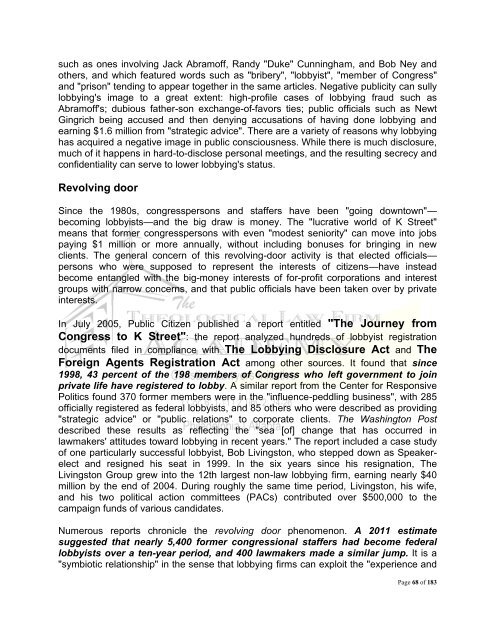The 508(c)(1)(a) Initiative Workshop
The 508(c)(1)(a) Initiative Workshop
The 508(c)(1)(a) Initiative Workshop
Create successful ePaper yourself
Turn your PDF publications into a flip-book with our unique Google optimized e-Paper software.
such as ones involving Jack Abramoff, Randy "Duke" Cunningham, and Bob Ney and<br />
others, and which featured words such as "bribery", "lobbyist", "member of Congress"<br />
and "prison" tending to appear together in the same articles. Negative publicity can sully<br />
lobbying's image to a great extent: high-profile cases of lobbying fraud such as<br />
Abramoff's; dubious father-son exchange-of-favors ties; public officials such as Newt<br />
Gingrich being accused and then denying accusations of having done lobbying and<br />
earning $1.6 million from "strategic advice". <strong>The</strong>re are a variety of reasons why lobbying<br />
has acquired a negative image in public consciousness. While there is much disclosure,<br />
much of it happens in hard-to-disclose personal meetings, and the resulting secrecy and<br />
confidentiality can serve to lower lobbying's status.<br />
Revolving door<br />
Since the 1980s, congresspersons and staffers have been "going downtown"—<br />
becoming lobbyists—and the big draw is money. <strong>The</strong> "lucrative world of K Street"<br />
means that former congresspersons with even "modest seniority" can move into jobs<br />
paying $1 million or more annually, without including bonuses for bringing in new<br />
clients. <strong>The</strong> general concern of this revolving-door activity is that elected officials—<br />
persons who were supposed to represent the interests of citizens—have instead<br />
become entangled with the big-money interests of for-profit corporations and interest<br />
groups with narrow concerns, and that public officials have been taken over by private<br />
interests.<br />
In July 2005, Public Citizen published a report entitled "<strong>The</strong> Journey from<br />
Congress to K Street": the report analyzed hundreds of lobbyist registration<br />
documents filed in compliance with <strong>The</strong> Lobbying Disclosure Act and <strong>The</strong><br />
Foreign Agents Registration Act among other sources. It found that since<br />
1998, 43 percent of the 198 members of Congress who left government to join<br />
private life have registered to lobby. A similar report from the Center for Responsive<br />
Politics found 370 former members were in the "influence-peddling business", with 285<br />
officially registered as federal lobbyists, and 85 others who were described as providing<br />
"strategic advice" or "public relations" to corporate clients. <strong>The</strong> Washington Post<br />
described these results as reflecting the "sea [of] change that has occurred in<br />
lawmakers' attitudes toward lobbying in recent years." <strong>The</strong> report included a case study<br />
of one particularly successful lobbyist, Bob Livingston, who stepped down as Speakerelect<br />
and resigned his seat in 1999. In the six years since his resignation, <strong>The</strong><br />
Livingston Group grew into the 12th largest non-law lobbying firm, earning nearly $40<br />
million by the end of 2004. During roughly the same time period, Livingston, his wife,<br />
and his two political action committees (PACs) contributed over $500,000 to the<br />
campaign funds of various candidates.<br />
Numerous reports chronicle the revolving door phenomenon. A 2011 estimate<br />
suggested that nearly 5,400 former congressional staffers had become federal<br />
lobbyists over a ten-year period, and 400 lawmakers made a similar jump. It is a<br />
"symbiotic relationship" in the sense that lobbying firms can exploit the "experience and<br />
Page 68 of 183
















